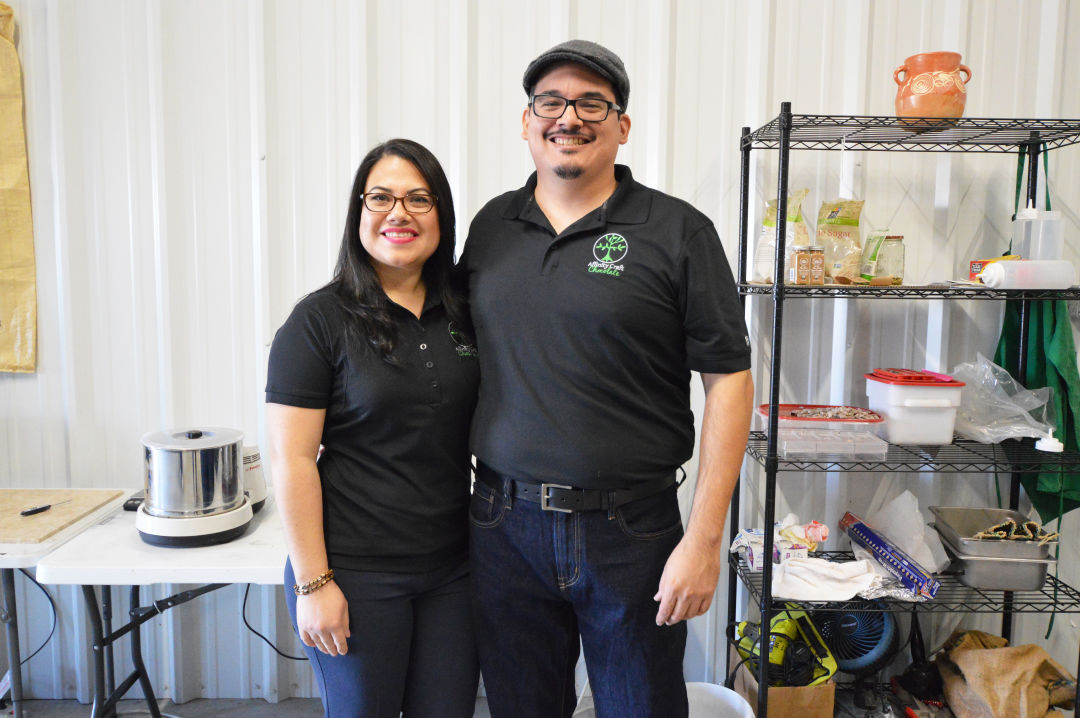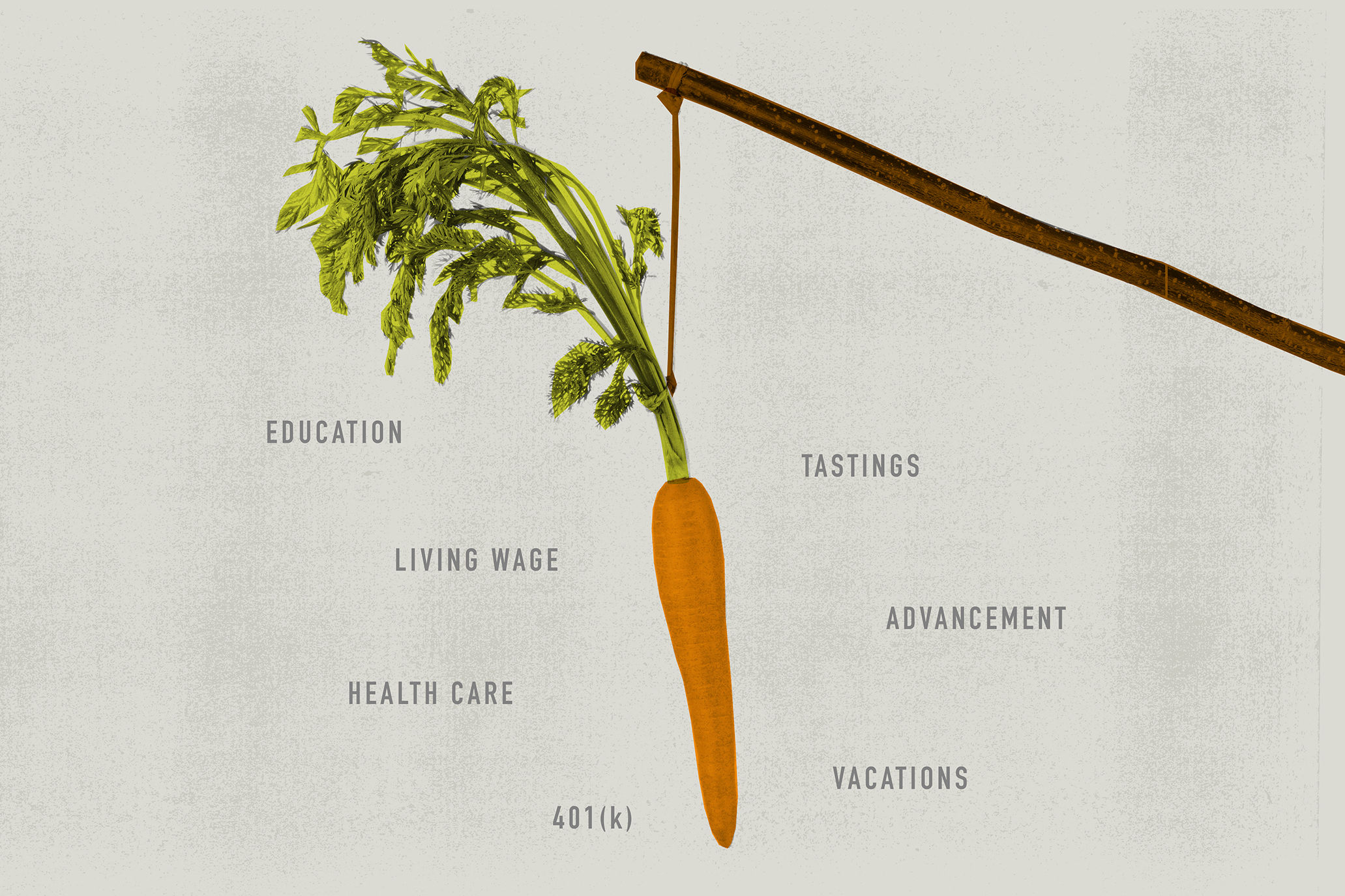Made in Houston: Affinity Craft Chocolate

Marisol Bravo and Chris Campbell produce bean-to-bar chocolate with love.
Image: Ellie Sharp
Product name: Affinity Craft Chocolate
Name: Chris Campbell and Marisol Bravo
Age of business: 1.5 years
Type of product: Bean-to-bar, organic single-origin chocolate bars, hot chocolate and cacao nibs. One of only about four such chocolate makers in Texas and roughly 300 in the country.
Where to find it: Online; at Memorial Village and East End farmers markets; and at select retailers such as Kraftsmen Baking & Café. Full list available on their website.
Affinity Craft Chocolate got its name from a love story. It started between and boy and a girl, Chris Campbell and Marisol Bravo. They married and from their love came a gift. Bean-to-bar chocolate, carefully crafted in Sugar Land. And it's not just the proud parents who are thankful for that bundle of joy. Chocolate lovers all over Houstonia are falling in love with the ultra-dark bars, as well as milk chocolate made with goats' milk and Abuelita-style drinking chocolate tablets.
We sat down with Campbell to talk about what keeps him inspired.
Houstonia: What inspired you to become a chocolate maker?
Chris Campbell: I’m not sure anything inspired me to be a chocolate maker specifically but I always wanted to be a maker of some sort. We both like to create things—we both like cook at home and use different ingredients. I have a friend who roasts coffee and I would help him out at the farmers' market table. They gave us the opportunity to do our own thing there so we thought of hot chocolate because it would go well with the coffee.
Marisol remembered her grandmother’s process of making hot chocolate in Mexico. We started with that basic idea, got some more advice, did our own research and went from there. We started out with hot chocolate before moving to the bars about five months later.
Houstonia: What inspired the transition to making bars?
Campbell: Learning that there were different cacao beans from different farms and that each had its own taste. Once we found that out we really wanted to bring out the different tastes. We felt that the chocolate bar was a better way to do that than the hot chocolate, especially since a chocolate bar you can do year round but a lot of people don’t want to do hot chocolate year round.
Chocolate is in many ways a lot like wine or coffee: Depending on where it’s grown, the climate, the soil, even how the farmer produces it will affect the flavor of that crop. That was the turning point where we started learning more about chocolate and wanting to be able to bring out those flavors and share them with people and help people to see how amazing chocolate could taste beyond what you find in the store.
Houstonia: How did you choose the cacao beans that you use?
Campbell: In the beginning we started with just one bean that we could find locally at Canino Produce on Airline. We didn’t find out too much about it. We found out it was a Mexican bean and didn’t find out much beyond that.
One of our goal is to be able to know directly where our chocolate is coming from, where our cacao is coming up. To know the farm but also to know more than that so we know that it's being produced ethically, that the farmers and workers are getting a fair wage, and that they’re able to also give back to the community. We kept looking so we could find a better quality bean that would help support the farmers and also help people understand more—that a lot of these farmers aren’t getting hardly anything for their chocolate, even the ones we use.
One of our goals is to be able to go and work directly with the farmer and pay them directly instead of going through a middleman. We started with the Mexican bean and moved eventually to beans that are supplied by Tejas Chocolate Craftory up in Tomball.
Have you always been interested in food?
Personally, yes. My mom taught me how to cook at an early age. I like that process of creating something and then having someone enjoy it and [seeing] the look on their face when they love it. And I think for Marisol the same thing too. She’s an excellent cook. She’s able to go into the kitchen and look at what we have and say okay I’m going to make this and it always turns out good. So yeah, I’ve always been interested in food and crafting things out of food for people to enjoy.
Houstonia: We always talk about local being important, but your cacao isn't being grown in Texas. Why should locavores still support your business?
Campbell: I think that the local movement is sometimes more a movement away from corporations or big, faceless companies and machines that can be nationwide or worldwide. There’s no passion there, it’s all about money.
Definitely we’re using cacao beans that are grown very far away. It’s not very local, but it’s that same idea that we are supporting people and we’re helping people out by making sure that they get a fair price. It’s not something we’re just reselling—we’re creating, crafting, bringing out the best qualities of this product so that people around here can enjoy it.
Definitely local is very important and being able to support people that you see. I think people really enjoy that too and coming to a farmers' market and meeting us and learning that we really make this chocolate ourselves. I think people sometimes before they hear that they hear how much our chocolate costs and question why they would pay $6 for our chocolate. But they realize it’s handcrafted and they see the value in that. It’s good to meet the people who are making the stuff that you are putting into your body.
How did you last prepare or enjoy your chocolate?
We eat a lot the chocolate throughout the whole process to make sure it’s going the right way. But I really like drinking chocolate for some reason—I’ll get a bar and melt it down sometimes and drink it pretty dark. I do savor it as part of the testing process to make sure it does hit those different tasting notes.
Do you ever cook with it at home?
Yeah, definitely. I recently made chocolate chip cookies. I chopped some up pretty fine and used one of our dark chocolate bars. I’ve made cakes, used the nibs for oatmeal, put it in smoothies, we put it in mole a lot. We’re always experimenting. We want to make cookies at some point and take it to the farmers' market and let people sample and see what they can do with the chocolate besides eating it. And we have people ask if they can cook with our chocolate and we say just cut it up and put in your recipe. We do have some bakers who buy blocks for their cakes and things like that.
What has been the most difficult part about transitioning to your former career to being a chocolate maker?
Before I was a tech guy for HISD [Houston Independent School District] and a lot of that is actually helpful in this business because for small batch chocolate markers there are not too many small pieces of equipment that you can use to process the chocolate. Pretty much every small batch chocolate [maker] has to build their own equipment. Starting off, a lot of our stuff was put together with duct tape and rope and pipe and stuff like that. It helped having that tech background.
I think for anybody when they go from working for someone else to working for yourself I think organization and timing [is a challenge]. When you go from having a boss and then being your own boss. The challenge is during slow times to keep moving and keep up that pace.




